Are Pet Birds Dirty? Exploring Their Cleanliness
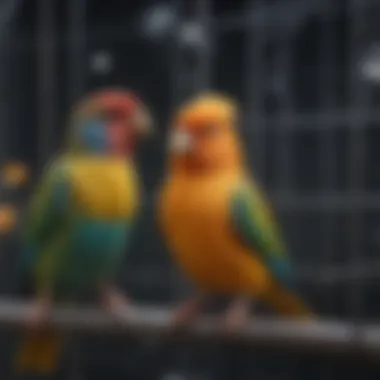
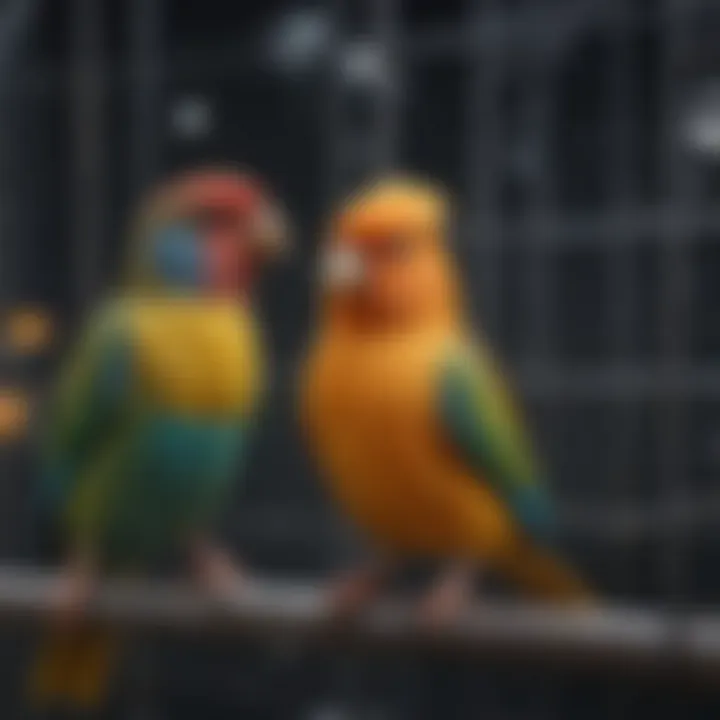
Intro
Birds are remarkable companions, and many people have turned to them for their unique personalities and charming antics. However, a nagging concern that often pops up for both seasoned bird lovers and those thinking about adding a feathered friend to their home is: are pet birds dirty? The perception of cleanliness in pet birds may vary widely depending on individual experiences, species types, and care approaches.
It’s easy to see how misconceptions can arise when people observe the natural behaviors of birds. From the little bits of seed they scatter around to the occasional plume of feather dust, the initial impression may not scream cleanliness. Yet, if you dig deeper, you'll uncover a fascinating world of avian hygiene. Birds engage in various habits that help maintain their well-being and cleanliness.
This article seeks to unravel the intricacies of bird hygiene, shedding light on their habits, and sharing tips on how to keep their environment spick-and-span. By understanding how to best care for our avian companions, we empower ourselves with knowledge that not only enhances their lives but also alleviates the worries about dirt and mess.
Prelims to Avian Cleanliness
When it comes to pet birds, the question of cleanliness often swirls around like feathers in a breeze. Many folks ponder whether these avian companions really bring more filth than joy into their homes. Understanding the cleanliness of pet birds is crucial, not just for prospective owners but also for seasoned bird enthusiasts. It informs how we care for our feathered friends and affects the environment they thrive in.
In this exploration, we will dive into various aspects that define cleanliness in birds. This includes grooming behaviors, their natural instincts to maintain hygiene, and how different species exhibit unique practices. Recognizing the significance of cleanliness can lead to a healthier and happier life for both the bird and its caregiver.
Defining Cleanliness in Pet Birds
Cleanliness in pet birds is multifaceted. It's not simply about ignoring the mess they might make; instead, it encompasses several behaviors, care routines, and even the setup of their environment. In essence, cleanliness can be viewed through a couple of lenses:
- Grooming Habits – Birds have an innate ability to groom themselves, engaging in behaviors such as preening, bathing, and feather maintenance. These actions not only keep their feathers tidy but also contribute to their overall health.
- Environmental Impact – The spaces they inhabit play a big role in their cleanliness. A well-maintained cage, fresh food and water, and proper sanitation can drastically affect the overall hygiene levels. If a bird's living area looks like a tornado swept through, it's a telltale sign that cleanliness is at stake.
For pet owners, recognizing these elements is key for ensuring proper care and fostering a healthy atmosphere. You can’t just look at a bird and assume it's clean; you need to observe and understand their behaviors closely.
Common Misconceptions About Bird Cleanliness
When it comes to the cleanliness of birds, several misunderstandings can muddle the waters. Here are some of the most common misconceptions:
- Birds are inherently dirty – While they can be messy due to their eating habits and natural behaviors, many birds are actually quite focused on grooming themselves. It’s like saying all dogs are dirty because they can get muddy. Many birds, such as cockatiels and budgies, invest significant time in preening.
- Messiness equals lack of hygiene – Just because a bird’s cage might look disheveled doesn’t mean the bird isn’t clean. Birds have a unique way of organizing their space, and it often seems chaotic from our perspective. Many birds are quite selective about where they spend their time.
- Only large birds need extra care – It’s easy to think that larger birds, because of their size, would need more attention regarding cleanliness. In reality, small birds like finches and canaries also require regular care and maintenance, even if they’re often seen as lower maintenance.
Understanding these misconceptions is vital for any bird owner. They can help shape expectations and encourage a more supportive relationship between bird and caregiver. By clearing up these misunderstandings, pet owners can focus more on best practices and cultivating a nurturing environment.
Grooming Behaviors of Birds
When it comes to understanding the cleanliness of pet birds, one must look no further than their innate grooming behaviors. These habits not only keep feathers in good condition but also are a vital part of the bird's overall health and well-being. Ignoring these grooming routines can lead to a variety of cleanliness-related issues, impacting both the birds and their living environment.
Preening and Its Importance
Preening is an essential behavior for birds. This seemingly simple act involves thorough feather grooming using their beaks to clean, straighten, and waterproof their feathers. It's more than just vanity; it's fundamental for maintaining feather integrity and insulation. Birds have a special gland near their tails, called the uropygial gland, which produces oil. They spread this oil onto their feathers while preening, which not only provides waterproofing but also helps to keep the feathers flexible. Healthy feathers mean better insulation against temperature changes and improved flight capability.
- Feather Hygiene: Preening removes dirt, dust, and parasites, minimizing health risks.
- Social Bonding: In many species, preening also serves a social purpose, helping strengthen bonds among flock members. This behavior reflects mutual trust and affection, making it an important social aspect.
Preening is a daily necessity. Observing your bird engaging in this behavior can be a good indicator of their health and comfort. If you notice they are not preening, it might point to stress or illness.
Dust and Feather Maintenance
Dust is an inevitable part of life, especially in the environment of pet birds. While it may often feel like a nuisance, it’s important to know that birds, particularly those from dusty species, produce body powder that helps in keeping their feathers clean. This fine powder assists in feather maintenance by absorbing moisture and providing a layer of protection against external contaminants.
- Dust Production: Birds like cockatiels and birds of paradise are known to produce more dust than others. Their unique feather structure contributes to this, which can result in higher household dust levels.
- Clean Environment: Regular cleaning routines for their living space can help mitigate the dust buildup in your home. A vacuum with a HEPA filter can be especially useful for improving air quality.
Keeping both pet and living space clean requires an understanding of their natural behaviors. Observing their dust reduction rituals not only enlightens caregivers on specific requirements but also sheds light on how to accommodate these habits in the home.
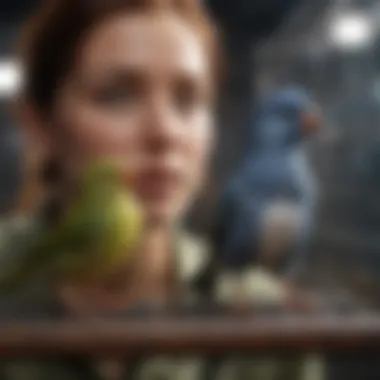
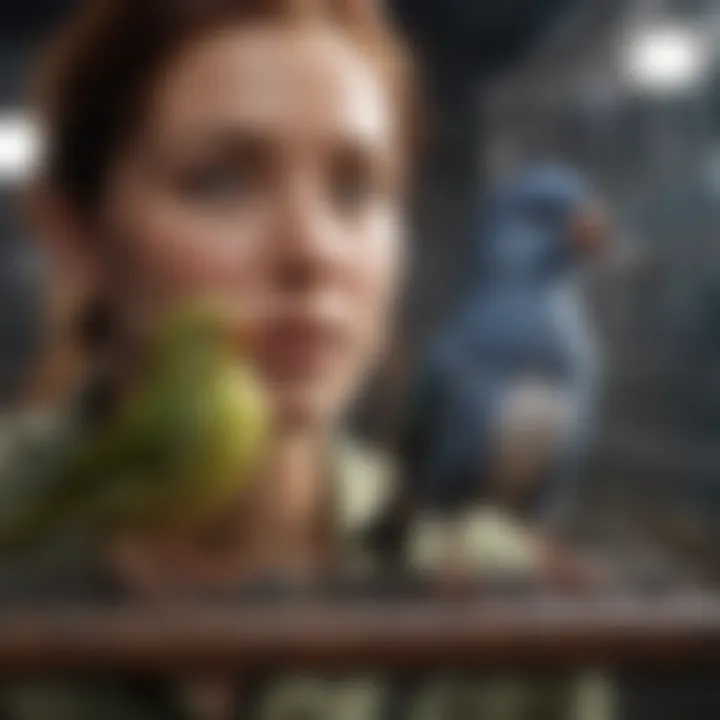
Bathing Habits of Different Species
Bird species vary significantly in terms of bathing habits. While some birds enjoy soaking in water, others prefer a fine mist to refresh their feathers. Understanding these differences can critically impact how caregivers maintain the cleanliness of their pets.
- Water Bathers: Species like canaries and finches revel in taking baths—watching them splash around can be quite a sight! So, providing a shallow dish of water regularly can encourage this behavior.
- Mist Showers: On the other hand, parrots and some other species respond well to being misted. Using a spray bottle to lightly mist them once or twice a week can help mimic their natural rainy environment from their native habitats.
- Individual Preferences: Every bird has its own washing style. It’s essential to pay attention to your specific bird’s preferences and adapt accordingly.
By engaging in the appropriate bathing routine, caregivers can help their birds maintain healthy plumage while keeping their living area clean. Regular bathing ensures that your feathered friend remains vibrant and healthy, showcasing their natural beauty.
In sum, the grooming behaviors of birds are integral to their cleanliness, health, and social interactions. Appreciating and accommodating these habits can create a more harmonious environment for both birds and their human caretakers. Taking the time to understand these behaviors will lead to a more rewarding pet ownership experience for everyone involved.
Assessing Cleanliness in Different Bird Species
Understanding hygiene requirements for various bird species is crucial for any present or aspiring bird owner. Each species can exhibit distinct grooming habits, maintenance needs, and preferences that affect their overall cleanliness. It’s not merely about whether a bird is perceived as clean or dirty, but rather about recognizing how their unique behaviors and characteristics influence hygiene. This insight can help owners provide the best care and create a safe, healthy environment for their feathered companions.
Small Birds vs. Large Birds
When it comes to avian cleanliness, there’s quite a difference between small birds like canaries or budgerigars and larger species like macaws or cockatoos. Small birds, due to their size, typically require less space and often take up less noticeable areas in the home. They tend to groom efficiently, spending a good portion of their day preening and rearranging feathers. Despite their smaller mess, they may scatter seed husks and droppings around their cages, which can accumulate if not tended to regularly.
Larger birds, however, can be real ruckuses. Their size leads to bigger messes. They can be notoriously messy eaters, flinging seeds and food around. Additionally, their droppings can be larger and more plentiful, posing a challenge for cleanliness. This doesn’t mean they are inherently dirty; rather, their care requires a greater commitment to regular cleaning and maintenance. Owners should not underestimate these cleaning duties, as a dirty environment can lead to health issues for the birds.
Tropical Birds and Their Unique Needs
Tropical birds, such as the colorful Amazon or the striking African Grey, come with unique cleanliness challenges. These birds thrive in humid environments, which presents specific difficulties when it comes to keeping them clean and maintaining their habitats.
First of all, the moisture can lead to a more rapid buildup of mold and mildew in their cages. This is not just unattractive but can potentially harm their health. Providing humidity is essential for their well-being, but alongside that, owners need to also ensure proper ventilation and cleanliness.
Additionally, these tropical species often require more frequent bathing to maintain their feathers in good condition. Birds like the cockatiel enjoy water and need opportunities to bathe regularly to keep their natural oils intact. Owners should provide suitable bathing options, which might include shallow bowls or misting with water. A clean environment alongside regular bathing ensures these birds remain healthy and vibrant.
Common Pet Birds and Their Grooming Needs
Common pet birds such as parakeets, cockatiels, and lovebirds have their specific grooming necessities that directly affect their cleanliness. Typically, most small to medium-sized pet birds are adept at grooming themselves, as long as they are provided with the right environment and opportunities. However, each species may need slightly different care.
For instance:
- Parakeets often require access to fresh water daily, not only for drinking but also for bathing.
- Cockatiels have a natural inclination towards dusting, which means they can create powdery remnants around their space. Regular cleaning is essential to manage this dust build-up.
- Lovebirds may engage in playful activities that can leave their cages quite disheveled. They need owners who can stay on top of spot-cleaning during the day.
Understanding these grooming tendencies helps owners maintain a cleaner environment, allowing them to enjoy their feathered friends without the constant concern of mess. A vigilant eye on their behavior and prompt cleaning measures creates a balanced relationship between pet owners and their birds.
Environmental Factors Contributing to Cleanliness
Understanding the cleanliness of pet birds goes beyond just the birds themselves. It's essential to consider the environment in which these creatures live. The cleanliness of a pet bird is heavily influenced by various environmental factors, which can significantly affect their grooming behaviors and overall health.
Cage Setup and Maintenance
A well-maintained cage is the backbone of your bird’s hygiene. The cage should be spacious enough for the bird to move around freely, which is vital for its physical and mental well-being. If space allows, providing perches at different heights can encourage exercise and prevent boredom.
Regular cleaning is non-negotiable. This includes daily spot cleaning to remove droppings and uneaten food, along with a more thorough cleaning on a weekly basis. When maintaining the cage, it's worth noting that different materials require different care. For instance, plastic cages are easier to wipe down, while wood can harbor bacteria if it becomes damaged or excessively soiled.
"An ounce of prevention is worth a pound of cure. This saying rings especially true for bird owners who prioritize hygiene."
Impact of Cage Material on Cleanliness
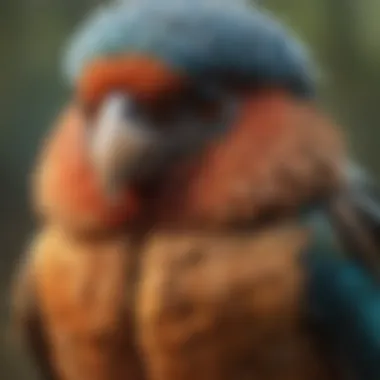
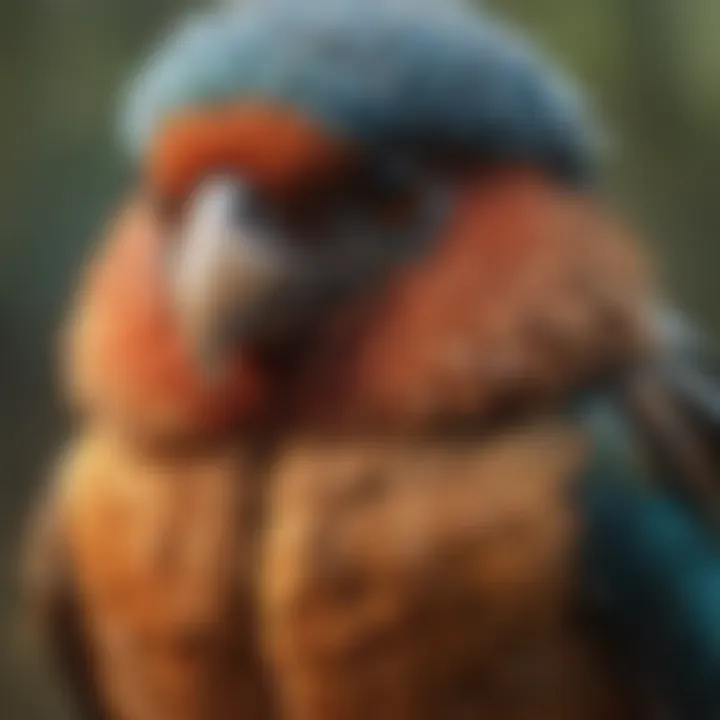
The choice of material for your bird's cage isn't merely an aesthetic decision. The material can greatly influence sanitation efforts and ease of cleaning. For example, metal cages, particularly stainless steel, are highly recommended due to their durability and resistance to rust and corrosion. They are less likely to retain odors and can be cleaned effectively with disinfectants.
On the other hand, wooden cages can be quite charming, but they carry risks. If the wood absorbs moisture and droppings, it can become a breeding ground for bacteria and pests. Furthermore, porous materials can retain smells, signaling that a thorough cleaning is overdue. As a general rule, steer clear of untreated wood cages; always choose materials specifically designed for pet birds.
Signs of a Healthy Habitat
Recognizing the signs of a healthy habitat is paramount for any bird owner. A bird's living space should inspire confidence about its cleanliness. Look for the following indicators:
- Minimal Odor: While it's normal for a bird’s habitat to have a mild scent, strong or foul odors indicate unsanitary conditions.
- Clean Feeding Areas: Food and water dishes should appear fresh daily. Discoloration or residue can suggest that these areas are not being cleaned routinely.
- Active Bird Behavior: A lively, active bird usually reflects a healthy living space. If a bird appears lethargic or withdrawn, it might indicate stress due to poor environment.
- Absence of Pests: Watch for any signs of pests like mites or flies. Finding these critters means you need to reevaluate your cleaning practices.
Adopting a proactive approach towards cage setup and daily maintenance not only strengthens your bird’s hygiene but also improves their quality of life. Regular check-ups on cleanliness factors can help ensure your feathered friend lives a healthy and happy life.
Diet and Its Role in Bird Cleanliness
The diet of pet birds is often an overlooked aspect when discussing their overall cleanliness and hygiene. A bird's nutrition directly contributes not just to its health, but also to its grooming habits and the cleanliness of its living environment. When we dive into the topic of bird hygiene, it becomes clear that what we feed our feathered friends holds more weight than one might assume.
Understanding Nutritional Impact
Birds, like other pets, depend on a balanced diet to thrive. This balance is crucial in maintaining their plumage and overall well-being. The right nutritional choices can enhance a bird's natural grooming activities. For instance, foods rich in omega fatty acids—such as flaxseed and fish oils—are linked to healthier feathers. Healthy feathers are not just essential for insulation and flight; they also reduce the likelihood of excess feather dander, which could lead to cleanliness issues in their habitats.
In addition, certain vitamins are vital for feather quality. Vitamin A promotes skin health and helps keep feathers strong and less prone to breakage. Without adequate vitamin A, a bird's feathers may appear dull or unhealthy, which might lead to more preening. The need for grooming then increases, potentially raising the mess within their cages.
Moreover, hydration plays a significant role too. Birds need to stay well-hydrated for various physiological functions, including feather maintenance. Dehydrated birds may have dry, brittle feathers that require more attention, making a mess of their living spaces with broken feathers and dust. Thus, understanding how diet influences hydration can be integral to preserving cleanliness.
How Food Choices Affect Bird Hygiene
Feeding choices don't just impact external health indicators; they can also affect how messy birds actually are. For instance, seeds, while a staple for many birds, can create a notable mess due to hulls and bits that scatter everywhere. Opting for a pelleted diet might seem cleaner as it tends to result in less waste, but it's crucial that this diet is well-balanced to avoid deficiencies.
Consider including a variety of fresh fruits and vegetables. These not only provide essential nutrients but can also prompt rich, vibrant poops that give caregivers insights into a bird’s health. However, these foods can also create quick messes. Fruits can lead to sticky residue if they aren't removed promptly. Bird owners should weigh the benefits of fresh produce against potential cleanup requirements.
Feeding habits also play a role. Birds are curious creatures. They often toss food around while foraging, leading to crumbs and scraps on the cage floor. To tackle this, caregivers might implement feeding strategies such as offering meals in foraging toys or on trays that can be easily cleaned.
"An ounce of prevention is worth a pound of cure. A thoughtful approach to diet can prevent bigger messes down the road."
This might lead to less waste spread outside their feeding area, thus contributing to a cleaner cage. Also, monitoring portion sizes can help minimize the quantity of food that ends up cluttering the cage floor.
In summary, the choices you make regarding your bird's diet can significantly influence not only their health but also the cleanliness of their environment. It’s a delicate balance of providing high-quality nutrition while remaining vigilant about the potential messes that come with it. Taking these factors into account can lead toward a cleaner, healthier life for our avian companions.
Common Health Issues Related to Cleanliness
Birds, like other pets, can face numerous health challenges linked directly to their environment and hygiene. When discussing pet bird cleanliness, it’s vital to recognize how poor hygiene can contribute to various health issues. Maintaining cleanliness isn't just about aesthetics; it plays a crucial role in the overall well-being of your feathered companion. Understanding these common health issues will help caregivers take proactive steps to ensure their birds stay healthy and vibrant.
Identifying Signs of Illness
Being aware of signs that indicate a bird is unwell is essential for any bird owner. Birds can be quite good at hiding their discomfort, so it’s up to their caregivers to stay vigilant. Here are some specific signs to look for that may indicate a health issue:
- Changes in droppings: Healthy bird droppings are firm and well-formed. If you notice any drastic changes in color, consistency, or frequency, it may signal a problem.
- Feather condition: Look for signs of feather loss or unusual ruffled feathers. Such changes might indicate stress or health conditions like mites or infections.
- Behavior change: A normally active bird becoming quiet or lethargic is often a red flag. Sudden increases in aggression or hyperactivity can also denote underlying issues.
- Respiratory symptoms: Listen for any unusual wheezing or catching breaths. Nasal discharge can also be a sign that something's amiss.
It's crucial for caregivers to keep an eye out for these symptoms and seek veterinary help when necessary. Regular check-ups with avian veterinarians can aid in the early detection of potential health crises.
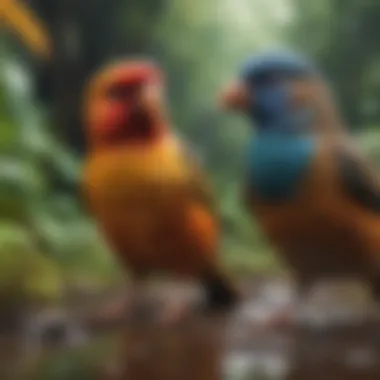
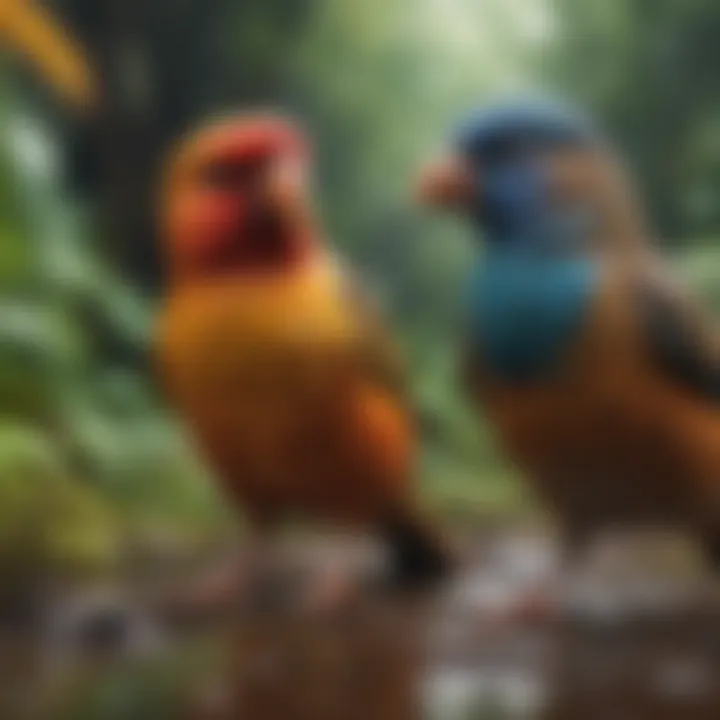
Preventative Measures for Optimal Health
Beyond identifying issues, establishing a regimen of preventative measures can significantly enhance your bird’s overall health. Cleanliness plays a pivotal role here. Consider these proactive strategies to ensure your bird maintains peak condition:
- Regular cage cleaning: A clean environment is fundamental. Regularly removing waste and soiled bedding prevents the growth of harmful bacteria and parasites.
- Proper diet: Nutrition directly impacts cleanliness and health. Feed a balanced diet rich in essential nutrients, and ensure fresh water is available daily
- Routine health check-ups: Regularly visiting an avian vet for health check-ups makes it easier to catch any potential issues early.
- Enrichment and exercise: Provide plenty of toys and opportunities for social interaction. This keeps birds mentally stimulated and physically active, reducing stress and improving overall health.
- Bathing rituals: Encourage bathing habits that support their natural grooming. Some birds may love water, while others might prefer misting. Observing what works best for your bird is crucial.
- Use safe, pet-friendly cleaning agents to wash the cage and accessories.
- Avoid high-fat foods and sugar-laden snacks.
- Discuss any changes in behavior or habits with the vet during these consultations.
Implementing these measures not only keeps your bird healthy but also enhances the bond between you and your pet. A clean bird is a happy bird, and attention to these details can make all the difference in their well-being.
"The overall cleanliness of your bird’s environment can significantly influence its overall health and happiness."
Caregivers’ Responsibilities in Bird Hygiene
When it comes to owning pet birds, the cleanliness of their environment hinges largely on the caregivers. The responsibilities of caregivers in bird hygiene are extensive and significant. It’s not merely about keeping a cage clean; it’s understanding that the health and happiness of a bird directly correlates with how well their space is maintained. Without consistent attention to cleanliness, even the most adored pet can become susceptible to health issues.
Establishing a Cleaning Routine
Creating a cleaning routine is like laying down the groundwork for a sturdy house. Without it, every effort to clean is half-hearted and could lead to a chaotic environment. A daily, weekly, and monthly schedule is beneficial.
- Daily Tasks: Each day, remove leftover food and replace it with fresh offerings. Check for droppings, as neglect in this area can lead to infections. Wipe down perches and toys. Just like humans, birds don’t like to sit in their mess.
- Weekly Tasks: Every week, look into deeper cleaning. This might involve soaking and scrubbing the cage base, washing down food and water bowls in warm, soapy water, and giving the toys a good scrub. It’s essential to rotate out old toys and replace them periodically to prevent bacterial growth.
- Monthly Tasks: At least once a month, consider giving the adult bird’s cage a thorough overhaul. This includes disassembling components of the cage for a good wash and putting everything back together with fresh bedding. Consider removing and sanitizing all the toys.
Moreover, it’s paramount to maintain a quick inspection of the bird’s health during cleaning. Any signs of unusual behavior or droppings should not go unnoticed, as they can provide clues to problems in hygiene or health.
Educating Yourself on Bird Care
Knowledge is power, especially in avian care. Understanding the specific needs and characteristics of your bird species can have lasting implications for hygiene. Each bird had its unique quirks and requirements, so doing your homework plays a crucial role.
Consider the following aspects while educating yourself:
- Researching Specific Species: Each bird, like a budgie or a cockatiel, has different hygiene habits and needs. Some birds produce more dust, requiring more frequent cleaning. Knowing how your bird behaves in terms of cleanliness helps tailor your care approach.
- Online Communities: Joining platforms such as Reddit might provide insight into the experiences of other bird owners. These forums are often full of advice and information that can aid in understanding common cleaning routines or figuring out how to deal with hygiene issues.
- Regular Vet Check-ups: Establishing a relationship with an avian veterinarian can open doors to professional insights that might not be widely known. Regular check-ups ensure that any health concerns are caught early on, thus potentially saving a lot of trouble down the line.
Educating yourself paints a clearer picture of what to expect while owning a bird, and it ensures that you are ready not just to enjoy your feathered friend, but to also provide a quality life for them.
"Taking care of a bird is not just about providing food and water; it’s about creating an overall environment where they thrive."
By putting in the effort to establish a cleaning routine and further educate oneself, pet bird owners can foster a healthy, happy living space for their cherished companions who depend on them.
Closure: The Balance of Care and Cleanliness
When discussing pet bird ownership, the intertwining aspects of care and cleanliness seem to often come up in conversation. The idea isn’t just about whether birds are unsanitary but rather focuses on how the environment and care practices can influence a bird’s overall hygiene and health. Recognizing this relationship is crucial for pet owners who take their responsibility seriously.
Birds, by nature, can be quite meticulous with their grooming routines. However, the key to maintaining their cleanliness involves understanding and supporting their needs. For instance, a well-kept cage and a balanced diet are fundamental. An unkempt environment significantly affects a bird's health, leading to various issues like feather dust spreading or the emergence of mold.
Moreover, caregivers need to engage actively in daily cleaning routines. Regularly removing waste and providing fresh food and water can mean the difference between a thriving bird and a sick one. It’s akin to keeping a car well-maintained; regular upkeep ensures that it runs smoothly and lasts longer.
"An ounce of prevention is worth a pound of cure." This proverb is deeply applicable to avian care.
When examining the broader implications of a bird’s cleanliness, one cannot overlook the emotional bond between a bird and its human. Clean spaces lead not only to healthier birds but also to happier owners. There is a sense of pride that comes from providing a clean, safe habitat for a feathered friend. In the end, a little diligence in daily care leads to a big pay-off in terms of the well-being of both pet and owner.
In essence, understanding the balance between care and cleanliness creates a win-win scenario. A clean environment fosters better health for your pet bird, enhances the overall home ambiance, and ultimately supports a stronger bond between birds and their caregivers.
As the bird adage goes, “A clean bird is a happy bird,” it's up to each pet owner to ensure that this becomes a reality.















